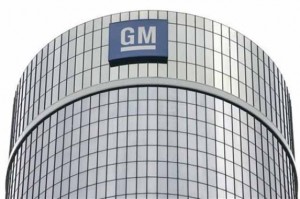Investors will be watching closely today to see if General Motors can maintain momentum after its stock closed at an all-time high on the first day of December trading – and just weeks before the federal government plans to sell off the last of the shares taken in return for GM’s $50 billion bailout in 2009.
GM stock closed Monday at $39.11, the highest figure since the “new” General Motors was formed in 2009 following the maker’s emergence from Chapter 11 protection. Shares briefly climbed as high as $39.39 during the day. The maker’s previous closing record was $38.98 on January 7, 2011.
GM shares subsequently took a sharp tumble, dipping down into the mid-teens during the summer of 2011. Its 52-week low, meanwhile, was $24.40. The automaker’s stock has been rebounding this year at a rate notably faster than the overall turnaround of the Dow Jones Industrial Average – which has itself been in record territory in recent weeks, nudging up as high as $16,174.51.
Industry analysts credit a variety of factors for GM’s recent upturn, including the maker’s steady stream of profits. Though the third quarter saw a dip of 53%, that was largely the result of one-time charges, and the maker still managed to beat Wall Street’s consensus forecast.
(White House will sell off remaining shares in GM by end-December. Click Here for the full story.)
There has also been cautious optimism that GM is finally getting a handle on its problems with a European subsidiary that has generated more than a dozen years of multi-billion-dollar losses. The maker is, among other things, closing a plant in Germany – a rare move in Europe – to bring capacity more in line with demand.
Wall Street also appears to be attracted to GM’s large cash war chest, which amounts to $27 billion – or about $19 per share. Overall, said investor website SeekingAlpha.com, the maker “seems to be a good deal for investors.”
That has clearly resonated with mega-investor Warren Buffett, whose Berkshire Hathaway holding company revealed in August it was increasing its holdings in GM by 60%. Buffett now controls 40 million shares, or 2.9% of GM’s outstanding stock.
One key question facing GM is whether it will come under pressure from activist investors to share some of that cash. The maker’s CEO Dan Akerson has so far cautioned that GM needs to keep plenty of funds in reserve to help it whether a weak U.S. economy while also funding its growth around the world. GM this year announced that it would join with its partners in China to invest $11 billion to expand its operations in that booming market.
(GM relocates international headquarters to Singapore. Click Hereto find out why.)
Another factor that helped buoy GM shares was the maker’s return to the S&P 500 index in June. That was not only a vote of confidence in the stock but also meant that a number of keyed investment funds would now be able to buy its shares.
Whatever the reason, one big investor continues to draw down its stake in the automotive stock. The U.S. Treasury last month announced it would sell off its remaining GM holdings by the end of December – well ahead of an earlier April 2014 deadline.
This year’s upturn in GM shares has been good news for taxpayers. During the 2012 presidential campaign, when former GOP candidate Mitt Romney suggested the White House sell out of GM immediately, the maker’s depressed stock price would have meant a roughly $20 billion loss on the 2009 bailout.
The Treasury will still be in the red but by less than half that figure. The latest estimate put the loss at $9.7 billion, though it could dip even further on GM’s latest run-up.
One thing seems certain, GM will be happy to see the feds go – and to free itself of the unwanted nickname, “Government Motors.” Resentment of the bailout has, according to some studies, cost GM a number of sales, though company officials say they can’t quantify the precise amount.
There are other pluses for GM, including the ability to once again issue a common stock dividend. The maker also will get out from under a strict limit on executive pay imposed by Washington on companies that took a bailout. GM officials have said the cap has restricted its ability to attract some of the industry’s best talent.
It remains to be seen whether GM also will reward itself after the government’s exit by replenishing its fleet of corporate aircraft. The Detroit Big Three all sold off their fleets after being spanked by Congress in late 2008 during a hearing in which senior executives flew down to Washington in corporate jets before begging for financial aid to get through the recession.
(GM has big expectations for downsized Colorado pickup. Click Here for a closer look.)

